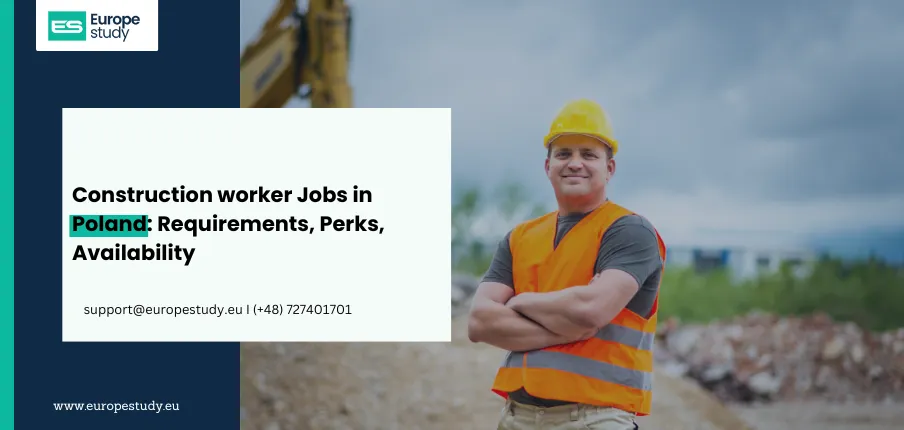
Construction worker Jobs in Poland: Requirements, Perks, Availability
Poland’s construction sector is thriving, thanks to ongoing urban development, large-scale infrastructure projects, and increasing housing demands. This has created a wealth of opportunities for both skilled and unskilled construction workers. If you’re considering a career in construction in Poland, here’s everything you need to know:
---
1. Job Roles in Poland’s Construction Sector
Poland’s booming construction industry offers diverse roles, including:
- Bricklayers and masons
- Electricians
- Welders and steel fixers
- Carpenters and joiners
- Plasterers and tilers
- General laborers and site helpers
These roles cater to both experienced professionals and individuals willing to take up unskilled positions.
---
2. Eligibility Requirements
To work as a construction worker in Poland, you’ll need to meet certain criteria:
- Work Permit: Mandatory for non-EU citizens and arranged by the employer.
- Experience: Skilled roles may require prior experience.
- Language Skills: Basic Polish is advantageous, though English or Russian is acceptable in some cases.
- Certifications: Certain positions, like welders or electricians, may require professional certifications.
---
3. Salary Expectations
The average monthly salary for construction workers in Poland ranges from PLN 3,500 to PLN 7,000 gross (€750–€1,500).
- Skilled Workers: Higher pay due to specialized expertise.
- Overtime Pay: Typically compensated at 150% or 200% of the standard rate.
- Many employers also offer benefits such as accommodation, transportation, and meals.
---
4. Work Schedule
- Standard hours: 8 hours/day, 5-6 days a week.
- Overtime: Common during peak construction seasons (spring and summer).
5. Documents Needed
To work in Poland, the following documents are required:
- Passport: Minimum 6 months validity.
- Work Permit: Arranged by the employer.
- Visa: Typically a D-type national visa for non-EU citizens.
- Employment Contract: Signed prior to arrival.
- Proof of qualifications (if applicable).
- Health Insurance: Mandatory for all workers.
---
6. Application Process
1. Job Search: Look for opportunities on platforms such as EURES, Pracuj.pl, and No Fluff Jobs.
2. Employer Sponsorship: Your employer applies for your work permit.
3. Visa Application: Submit your visa application at a Polish embassy or consulate.
4. Arrival and Registration: Register your address and apply for a Temporary Residence Permit (if needed).
---
7. Opportunities for Foreign Workers
Poland actively recruits foreign workers, particularly from countries like Ukraine, Belarus, India, Nepal, and the Philippines. Skilled professionals with international certifications enjoy better salaries and job prospects.
---
8. Challenges in Construction Work
- **Language Barrier**: Limited English usage on sites can be challenging.
- **Harsh Winters**: Outdoor work during Poland’s cold months requires resilience.
- **Physical Demands**: Construction work requires good health and stamina.
---
9. Benefits of Working in Poland’s Construction Sector
- Access to the **European labor market.
- Opportunities for **long-term residence and family reunification.
- Lower cost of living compared to other EU nations.
---
10. Key Cities for Construction Jobs
- Warsaw
- Kraków
- Gdańsk
- Wrocław
- Poznań
Helpful Tips for Job Seekers
- Learn basic Polish phrases to improve communication on sites.
- Verify the legitimacy of recruitment agencies and employers.
- Ensure contracts and work permits comply with Polish labor laws.
Poland’s construction industry offers excellent career opportunities for both skilled and unskilled workers. With competitive wages, growing demand, and the chance to work in a dynamic environment, it’s an ideal destination for those seeking a fulfilling career in construction. Take the first step and explore the possibilities that Poland’s construction sector has to offer!





